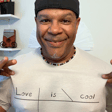Become a Creator today!Start creating today - Share your story with the world!
Start for free
00:00:00
00:00:01

22. Chi | The Big 5 Personalities in Your Chapter
Fraternity and sorority life has no shortage of big personalities. So, what is a chapter to do when almost everyone's personality takes center stage? This episode is dedicated to applying the Big 5 Model of Personality to those chapter brothers and sisters, so that everyone can better understand each other.
Transcript
Introduction to Ethocast and Leadership Programs
00:00:00
Speaker
I've got personality. It's episode Kai of Ethocast.
00:00:09
Speaker
Welcome to Ethocast, a podcast about sound leadership practices to boost life in college fraternities and sororities. I'm Eddie Francis, presenter of Followership to Leadership and the Black Greek Success Program. Presentations designed to help Greeks become more effective leaders. Hey, thank you so much for me this is leadership
00:00:41
Speaker
to the letter hey hey thank you so much for joining me on this episode of etho cast i'm eddie francencis it is good to have you as always Personality.
Challenges in Managing Big Personalities
00:00:53
Speaker
Boy, I tell you, when I was a college student, even though we had a few brothers in my chapter, and when I say a few, I'm talking about if we had nine brothers, that was a big chapter.
00:01:08
Speaker
11, enormous. fifteen 15, woo, get out of town.
00:01:14
Speaker
But it felt like we had 50 personalities because if you think about it, In Greek life or fraternity sorority life, we attract big personalities.
00:01:30
Speaker
And what the hell with these people, right? So when you have people in all of these personalities, what do you do with it?
00:01:41
Speaker
Because this one feels this way. That one acts that way. That person said that, and this person won't say anything. What?
00:01:52
Speaker
What? And so what I want to do is I want to help you understand how to categorize the personalities around you.
The Big Five Model in Leadership
00:02:03
Speaker
And I'm going to use this model called the big five model of personality.
00:02:08
Speaker
Okay. Actually, when I was in grad school, this is probably one of the coolest things that I learned about. And um if you're watching a video, you will see that I'm showing you one of my favorite textbooks from grad school, Leadership Theory, Application and Skill Development by Robert Lussier and Christopher Atchua.
00:02:25
Speaker
And um when I got to that part about understanding how personality impacts leadership, my mind just opened up. It blew up and then it opened up and then my brain fell back in my head.
00:02:39
Speaker
So why do we even need to worry about understanding people's personality? First things first, personality impacts behavior.
00:02:51
Speaker
And if you can get an idea of people's personality, then you can predict some of the things that they're going to do, some of the things that they're going to say.
00:03:03
Speaker
But the other thing about personality is that it also impacts people's perceptions of you and the attributes that they might assign to you.
00:03:15
Speaker
So This can help you get an idea of how and why people perform the way they do in your chapter.
00:03:26
Speaker
That's why when you take these personality tests, they tend to be so effective. Personality tests will just... give you an idea of of not only why you do what you do, but it matches certain activities and helps you understand why you might be into an activity, why you do a certain thing a certain way.
00:03:48
Speaker
One of the funniest personality test moments that um that I remember was ah someone used the example of going to the supermarket and shopping.
00:03:59
Speaker
And they said, you know, this kind of person, ah when they go to the supermarket, they just they have a list and they go by the list and they go straight down the list. And then they walk in and and there ist is no fooling around with them. And they don't want anybody with them because they don't want to be
Real-Life Personality Observations
00:04:14
Speaker
encumbered with people.
00:04:15
Speaker
But the other kind of person, they ah they don't have a list. They might have a list. They might have two items on the list and they come out with 50 things. and And going to the supermarket is a big old party because they want the whole family with them and that whole deal.
00:04:29
Speaker
And I remember the room just exploded laughing because a lot of us in the room, including me, were the types who like to turn ah trip to the supermarket into the family outing.
00:04:42
Speaker
and then Now, there are times, though, and this is the interesting thing about personality, is that personalities change. And I'm going to hit on that in just a little bit. But um now I'm at the point where I am kind of like all business and I have my list and I go in and I get out of there.
00:04:58
Speaker
But I still i still like to still like to go shopping with my wife. I know that sounds pretty weird for some people who might hear the husband say, I hate going to shop with my wife.
00:05:10
Speaker
I don't mind it. I don't mind it at all. You know, because again, i like I'm a social person. So
Exploring the Five Personality Dimensions
00:05:16
Speaker
that's that. Now, in talking about the this this big five model of personality, which is also known as the five factor model.
00:05:25
Speaker
There are five dimensions that you take a look at with the big five model. And in each dimension or each trait, um you can either be high in that dimension or trait, or you can be low in that dimension or trait. We'll use the word dimension.
00:05:41
Speaker
And here are the five dimensions of the big five model. model ah One is surgency, which other people refer to as extroversion. Agreeableness, which Adjustment, which can also be referred to by some as neuroticism, conscientiousness, and openness.
00:06:01
Speaker
Now, this is not about judging your frat brothers or your sorority sisters. And this is not about putting them in a box. This is about understanding them.
00:06:13
Speaker
And when you understand them, you can understand how they best operate in a chapter, but you can also understand how to communicate with them and you can understand how to work with them.
00:06:26
Speaker
But then you can also use this to understand the people who want to be members of your fraternity or sorority, who are going to be coming into your chapter or coming into your house. And Again, this is not necessarily about putting those people in a box, but understanding how they're going to come into the chapter of the house and how they're going to be able to work and communicate um with people and then how they're going to operate within the chapter. Now, this is also assuming that you are looking at people who are definitely down with the mission, vision and values
00:07:01
Speaker
of your fraternity or sorority. So let's get into it. Let's talk about the big five model of personality and how it applies to your chapter. The views expressed on EthelCast do not necessarily reflect the views of the hosts, guests, or any entities with which this podcast's participants are affiliated. Questions, comments, email eddie at eddiefrancis.com.
00:07:28
Speaker
So how does it work? What are these, how do these dimensions work? Let's start with surgency or again, extraversion as some may call it.
00:07:39
Speaker
Surgency is marked by senses of sociability, assertiveness and extraversion. So what happens when someone is high in the dimension of surgency?
00:07:54
Speaker
They like attention. They tend to be communicative, maybe a little too communicative. They tend to be sociable. They have lots of energy. Someone who is low insurgency, they like solitude.
00:08:08
Speaker
They are not big talkers. As a matter of fact, they may not even know how to start a conversation and they even might get exhausted by being sociable with people.
00:08:21
Speaker
funny story. When I was a Dean of pledges in my chapter, the line that I had was two brothers.
00:08:36
Speaker
I was high and I still am high insurgency, social, love to get attention. But these two guys,
00:08:48
Speaker
These cats did not like attention and they didn't do a whole lot of talking. I did not understand. i i I didn't get them. i I didn't know what to do with them sometimes.
00:09:02
Speaker
If I had known then what I knew now, I would have figured out how we could work together, how we could complement each other. i would have I would have thought much more carefully about about how to bring them through the process in a productive way, rather than getting upset, because i got kind of upset with them, you know, in my, ah, golly, how how old I was 19.
00:09:26
Speaker
So with my 19 year old mind, I got upset because, you know, I just didn't think they were outgoing enough and that sort of thing. But now I'm sitting here going, huh?
00:09:37
Speaker
Okay. So These are the cats who like to work behind the scenes. They don't like a whole lot of attention. And that is okay because we need the worker bees behind the scene who make things go and who really help us get the job done.
00:09:55
Speaker
While the people who are like me, who are sociable, high insurgency, we go out and we grab the attention. We bring people to the party. We go out and we win the Greek shows and all that sort of thing.
00:10:06
Speaker
And so that's an example of, you know, two dimensions of being high and low in a dimension and how those, how those parts can work with one another. So let's go to another dimension. Let's talk agreeableness.
00:10:21
Speaker
So agreeableness is a dimension that is marked by trust, kindness, pro-social behaviors as verywellmind.com puts it. And oh, by the way, the two sources that I am working with are my trusty textbook here, but then also verywellmind.com.
00:10:40
Speaker
So when someone is high in agreeableness, what does that mean? This is someone who is interested in others. They tend to be empathetic. They have a sense of altruism and they're service oriented.
00:10:50
Speaker
Someone who is lot who is low in agreeableness, they might not be so interested in dealing with people. They might lack empathy even, and they might even have this tendency to insult people and maybe even manipulate people.
00:11:07
Speaker
Now, how could that possibly be good in a fraternity or sorority? Well, first of all, you can't stop it. People like that are going to get into the fraternity or sorority because they have other traits that get them into the fraternity or sorority.
00:11:24
Speaker
but he What do you do with these people in the chapter, though? Doesn't this mean they're going to tear the chapter up? They might, but they might not. Because here's the thing.
00:11:36
Speaker
that time that you don't want to have that hard conversation with that brother or that sister, because you don't want to hurt anybody's feelings. These are going to be the people who are going to pull you aside and they're going to say, okay, listen, this is a business discussion you're having with this person, or this is a policy discussion.
00:11:56
Speaker
I hate to tell you this. There's no room for feelings here. so you're going have to do what you got to do here. This is the person who, when the chapter won't cooperate,
Emotional Stability in Chapters
00:12:06
Speaker
They can help you slow walk everybody into the stuff that you need them to do.
00:12:11
Speaker
So that's how the high and low of agreeableness can work. Next one. Third one. Adjustment. This is marked by emotional stability.
00:12:24
Speaker
Also, it is marked by a sense of confidence. People who are high in adjustment tend to have emotional intelligence. They tend to be confident, self-confident, and they tend to show self-control.
00:12:39
Speaker
So that means that people who are low, they tend to be insecure. They tend to be unstable. They might be a bit on the narcissistic side. And so ah have to say, this is probably the one dimension where having people who are low in adjustment can be a problem, especially if you have people who are narcissistic in your chapter.
00:13:04
Speaker
And narcissism is something that is ah marked by these feelings of self-importance and also grandiosity and vulnerability. And that vulnerability is driven by a lot of insecurity.
00:13:19
Speaker
And so this is one of the things that while it you know It can balance things out, but it can still be destructive to the chapter. And you do have to watch the dimensions of ah adjustment, or at least you have to watch the high and the low of adjustment.
Impact of Conscientiousness on Organization
00:13:38
Speaker
Conscientiousness. Conscientiousness is marked by thoughtfulness, dependability, and integrity. So what does it look like when you have someone who is high in conscientiousness?
00:13:50
Speaker
Well, they like to be prepared for things. They're organized. They're detail-oriented. um They finish tasks pretty quickly. You know that they're going to get it done.
00:14:01
Speaker
People who are low in conscientiousness, they tend to procrastinate. They do tend to lack structure. they um They tend to be a bit organized and they don't like being in the weeds with things because it's just way too much happening in the in the details.
00:14:19
Speaker
You know, when it comes to this dimension, I have to say, I feel very attacked when we talk about being low in conscientiousness. Dang it.
00:14:30
Speaker
But The other side of that, by the way, is that when you have someone who is low in conscientiousness, listen, i um I will be the first to tell you, when I was in my college chapter and on a few of my jobs, I was a pain in the butt to people sometimes because i i was so unorganized and and I'm way more organized than I used to be because I'm much more cognizant of my lack of organization.
00:14:58
Speaker
um and and i And I will say this, full transparency. one of the reasons i One of the reasons I am so much cognizant of my lack of organization is i was diagnosed recently, as in a couple of years ago, with ADHD.
00:15:12
Speaker
And so that's something to think about when you see a certain personality, you know, could there be some neurodivergence going on there? But but when it comes to conscientiousness, um I would say that those brothers who I was the dean of pleasures for um in that line for fall of 89, they were high in conscientiousness.
00:15:34
Speaker
And so that's why we kind of clashed a little bit.
Openness and Creative Flexibility
00:15:37
Speaker
right, let's take a look at the last one, and that would be openness. When you take a look at the dimension of openness with the big five model of personality, we're talking about being flexible. We're talking about being imaginative.
00:15:51
Speaker
And we're also talking about having a locus of control. Now, a locus of control is um basically your sense of belief about controlling your destiny.
00:16:05
Speaker
And I'll talk about this in just a second. But people who are high in openness tend to be creative. They like to try new things. They invite abstract ah concepts.
00:16:16
Speaker
But then the other thing about being high in openness is that people who are high in openness tend to have an internal locus of control. They tend to believe that they are in control of their destiny.
00:16:31
Speaker
People who are low in openness, ah they tend to lack imagination. They don't necessarily like change a whole lot. Their thinking tends to be a bit linear. As a matter of fact, maybe even literal sometimes. and while it's not necessarily a solid thing, while it's not a definite thing, there's a tendency there to have what's called an external locus of control.
00:16:54
Speaker
And what that external locus of control means is that they believe that their destiny ah is impacted by other people. So when you take a look at all of these dimensions, the big five ah model of personality, all of these personalities, you take a look at the dimension of openness, conscientiousness, adjustment, agreeableness, and surgency, the job here for you as a frat brother or a sorority sister is to get an idea of how your frat brothers or your sorority sisters operate.
Improving Chapter Dynamics with Personality Insights
00:17:34
Speaker
And when you get to understand them, that guides how you communicate and it guides how you collaborate with the folks in your chapter. But it also can help you point out some of the tendencies of people in other student organizations on your campus.
00:17:53
Speaker
It can help you kind of maybe understand how your professors may operate, how the administrators on your campus operate. you observe certain behaviors and you think that you might be able to match something there.
00:18:06
Speaker
You might take a look at the president of the college of the university and you might say, oh, you know what? That's why this person did this. This person is pretty low insurgency. And so, um and and but but I will say this, you know guessing can be an iffy thing. So be careful of what you guess.
00:18:25
Speaker
That is why i want to make one big suggestion to you. I would like for you, when you get the opportunity um to go to your office of fraternity or sorority life or contact them over the summer, contact your office of student life and get a big five personality test and schedule. If you haven't done so, schedule a retreat with your chapter.
00:18:52
Speaker
and administer the chat the test to your chapter, or have other people administer the test to your chapter. If you have a guest speaker coming in, ask the guest speaker if this is something that they do, whether or not they administer this big five personality test.
00:19:09
Speaker
Because once you find out about how people in your chapter tick, you can figure out how to make the chapter go. And so
Closing and Audience Engagement
00:19:20
Speaker
that's it.
00:19:20
Speaker
Thank you so much for joining me on this episode of Ethocast. And I really hope that you get the opportunity to work together as a chapter. I hope that you take this opportunity to learn more about each other and learn more about your tendencies.
00:19:36
Speaker
Hey, if you have any questions, you know like exactly where to find me. You can find me at Eddie at Eddie Francis dot com. You know that I do have programs that I do. Followership to leadership is my flagship program.
00:19:49
Speaker
Also, lead by leading you is another program because understanding this is also good. As I mentioned in the beginning, it's also good for self-awareness. So with that.
00:20:01
Speaker
Thank you very much for joining me on this episode of Ethocast. Ethocast is a for our edification limited series. If you like what you heard, like and follow this podcast for more leadership insights for your fraternity or sorority chapter. To find out how you can bring followership to leadership or the Black Greek Success Program to your campus or a campus near you, email today, eddy at eddyfrancis.com. Until next time, spread brotherly and sisterly love wherever you go.



















